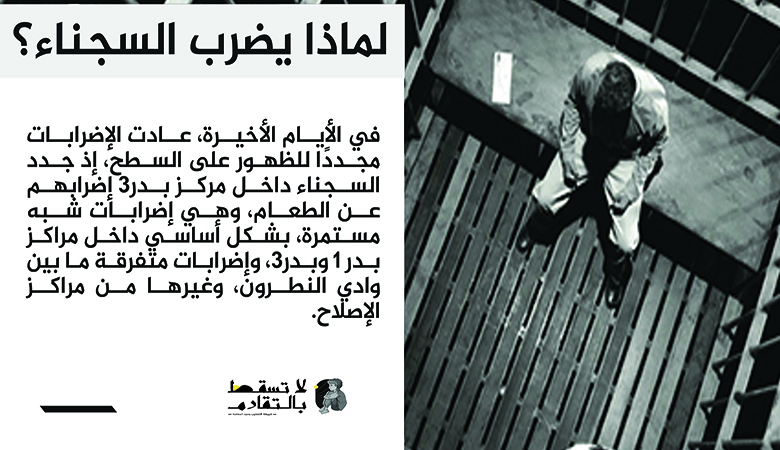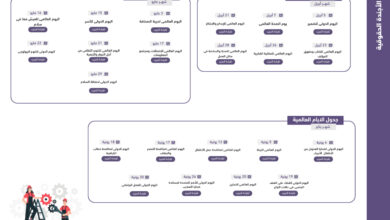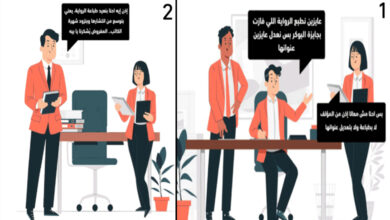لماذا يضرب السجناء؟

في الأيام الأخيرة، عادت الإضرابات مجددًا للظهور على السطح، إذ جدد السجناء داخل مركز بدر3 إضرابهم عن الطعام، وهي إضرابات شبه مستمرة، بشكل أساسي داخل مراكز بدر 1 وبدر3، وإضرابات متفرقة ما بين وادي النطرون، وغيرها من مراكز الإصلاح.
نسعى للإجابة عن تساؤل “لماذا يضرب السجناء ؟”، من خلال تتبع/ إلقاء الضوء على الظروف التي يعايشها السجناء في الداخل، وفي المقابل عرض معاناة الأهالي خلال الزيارات.
ونبدأ ذلك بالحديث عن أوضاع الرعاية الطبية داخل المراكز الجديدة بصورة موجزة.
هل البنية التحتية هي المشكلة الوحيدة في الرعاية الطبية داخل السجون؟
فيديو للمركز الطبي بمجمع مراكز بدر: للاطلاع أضغط هنا
ما الذي ينظم تقديم الرعاية الطبية داخل السجون؟
“إذا لم تتوافر أسباب علاج مسجون بمستشفى السجن ورأي طبيب السجن ضرورة علاجه بمستشفى خارجي، وجب عليه أن يرفع تقريرا إلى الإدارة الطبية بمصلحة السجون لتقرير ما تراه.
أما في الحالات الطارئة أو المستعجلة فلطبيب السجن أن يتخذ ما يراه ضروريا للمحافظة على صحة المسجون مع موافاة المصلحة بتقرير طبي عاجل منه.
وإذا رأي الطبيب أن حالة المريض تستوجب أخذ رأي طبيب أخصائي وجب عليه استئذان مصلحة السجون في ذلك ويؤخذ الإذن تليفونيا في الحالات المستعجلة، ولطبيب السجن أن يأمر بقبول الأدوية التي ترد للمسجون من الخارج إذا رأى ضرورة لذلك”.
المادة (37) من اللائحة الداخلية لتنظيم السجون.
تنص المواد 33 إلى 37 من قانون تنظيم السجون-مراكز الإصلاح والتأهيل- كما تنص اللائحة الداخلية لتنظيم السجون في المواد من 24 إلى 44 على مبادئ أساسية للرعاية الطبية داخل السجون، بداية من وجود طبيب داخل كل سجن مسؤول عن صحة السجناء والكشف عليهم بمجرد وصولهم السجن، مرورًا بنقل السجناء لمستشفيات خارج السجن في حال عدم توفر الإمكانيات داخل مستشفى السجن.
وصولًا إلى دور الصيدلي في حفظ الأدوية ومنحها بحسب إرشادات طبيب السجن.
الإهمال الطبي أو الامتناع عن تقديم العلاج هو أحد الانتهاكات الممنهجة التي يتعرض لها السجناء داخل السجون المصرية، بسبب الإهمال والتعنت من قبل مسؤولي السجن من جهة، ومن الجهة الأخرى المستشفيات التي تفتقر إلى الحد الأدنى من البنية الأساسية-في السجون القديمة-، إلى جانب التعنت في النقل إلى مستشفيات خارج السجن.
ولكن هل تغير الوضع بعد نقل السجناء إلى مراكز الإصلاح الجديدة خاصة مع وجود مراكز طبية مجهزة؟.
نستطيع الإجابة من خلال عاملين شديدي الأهمية كمؤشر على أوضاع الرعاية الطبية داخل تلك المراكز:
أولًا: الحالات الطبية الطارئة
“الوضع دة بيبقى مأساة في حالات الطوارئ، بيقعدوا يخبطوا بالساعات علشان حد يرد عليهم من السجن”.
شهادة شقيقة سجين في بدر1.
هل يوجد ما ينظم كيفية تقديم الرعاية الطبية داخل قانون تنظيم السجون ولائحته الداخلية في حالات الطواريء؟
بحسب المادة (37) من اللائحة الداخلية تعتمد السجون في التعامل مع الحالات الطارئة بصورة أساسية على طبيب السجن، وبصرف النظر عن سلطاته المقيدة من قبل إدارة السجن، إلا أن الوصول إلى طبيب السجن من الأصل في حالات الطوارئ هو أمر من الصعوبة تحققه، خاصة مع نقل السجناء إلى مراكز الإصلاح والتأهيل الجديدة، إذ ازداد الأمر سوءًا فيما يخص التعامل مع الحالات الطبية الطارئة لا سيما مع التقليص المتطرف للتعامل البشري داخل تلك المراكز، -إذ يتعامل السجناء مع الإدارة من خلال انتركوم مثبت داخل الزنازين، وتتعامل الإدارة من خلال سماعات داخل الزنازين أيضًا-، وعادة لا تستجيب الإدارة لاستغاثات السجناء في حال وجود حالات طبية طارئة، فبحسب أهالي السجناء قد تستجيب الإدارة بعد نداءات واستغاثات السجناء ب 6 ساعات على أقل تقدير، وهو ما يساهم -جزئيًا-في ارتفاع في أعداد الوفيات والتي تقدر بحوالي 131 حالة في الفترة ما بين عام 2022 إلى أكتوبر 2024 -بحسب المفوضية المصرية للحقوق والحريات-.
ثانيًا: الأدوية
“لا يصرف الصيدلي أي دواء من الأدوية إلا بناء على أمر مكتوب من طبيب السجن”
المادة 42 من اللائحة الداخلية لتنظيم السجون.
تشير المادة السابقة إلى دور الصيدلي في حفظ الأدوية، كما تشير إلى أهمية دور الطبيب في الكشف على السجناء لكي يتمكن من تشخيصهم وبالتبعية التوصية بالدواء المناسب، أو حتى السماح بدخول الأدوية من خلال زيارات الأهالي.
إلا أنه وبحسب مقابلات أجرتها المفوضية المصرية للحقوق والحريات مع ذوي سجناء حاليين داخل مراكز الإصلاح والتأهيل الجديدة، في العادة لا يقوم الطبيب بالكشف على السجناء عند دخولهم السجن، دون الالتفات إلى ما تنص عليه المادة 27 من اللائحة الداخلية من ضرورة الكشف على السجناء بمجرد دخولهم، ومتابعة حالة المرضى منهم.
كما رووا لنا عن معاناة السجناء في تناول الأدوية في المواعيد المحددة، إذ لا تسمح إدارات السجون للسجناء بدخول الأدوية داخل الزنازين لتناولها بأنفسهم، بل تقوم الإدارة بوضع الأدوية داخل صيدلية السجن، ويتم صرفها حسب رؤية إدارة السجن وليس بحسب احتياج السجين أو توصية الطبيب، وقد يتم معاقبة السجناء -حسب تصنيفهم في الداخل- بالحرمان من الأدوية “الدوا بيتمنع بالأيام عن بعض المساجين كنوع من أنواع العقاب، الفكرة في طريقة التعامل والإهمال الطبي، وهو قعد يتكلم تحديدا على ن.س، بيقول ان هما يعاقبوه ان هما مش بيدولوا أدويته.
وهو عنده القلب واكتر من مرض مزمن.
موضوع الأدوية دة بيبقى على حسب الشخص، لان بعد الاضرابات الاخيرة الناس كانوا بيدخلوا لها الادوية بتاعتها جوة.
بس مفيش تلاجات في الزنازين فالأنسولين والحاجات اللي زي دي اللي بتحتاج تتحفظ بتفضل مع الإدارة.
وفيه ناس حتى أدوية الصداع مش بيدخل معاهم.
وفيه أهالي اشتكوا ان الادوية بتتاخد منهم في السجن في الأمانات، بس الأدوية ما بتوصلش للسجناء جوة خالص”.
To read the report in English
Why Are Prisoners on Strike?
In recent days, hunger strikes have resurfaced, with prisoners at Badr 3 prison renewing their hunger strike. These strikes are nearly continuous, primarily within Badr 1 and Badr 3 prisons, along with sporadic strikes in other facilities like Wadi El-Natrun and various other correctional centers. To answer the question, “Why are prisoners on strike?”, we aim to shed light on the conditions prisoners face inside the prisons, while also highlighting the suffering of their families during visits. We begin by discussing, briefly, the medical care situation within the new facilities.
What Regulates the Provision of Medical Care in Prisons?
“If the necessary treatment for a prisoner is not available within the prison hospital and the prison doctor deems it necessary to treat the prisoner at an external hospital, the doctor must submit a report to the medical administration of the Prison Authority for further action. In emergency or urgent cases, the prison doctor may take whatever steps are necessary to preserve the prisoner’s health and must provide the Prison Authority with an urgent medical report.
If the doctor believes the prisoner’s condition requires the opinion of a specialist, permission from the Prison Authority must be sought. In urgent cases, permission can be obtained by phone. The prison doctor may also order the acceptance of medicines sent from outside the prison if deemed necessary.”
Article (37) of the Internal Regulations for Organizing Prisons
Articles 33 to 37 of the Prison Organization Law – Correctional and Rehabilitation Centers – along with Articles 24 to 44 of the Internal Regulations for Organizing Prisons, establish the basic principles for medical care inside prisons. This includes having a doctor at every prison responsible for the health of prisoners and conducting medical examinations upon their arrival, transferring prisoners to external hospitals if the prison hospital is unable to provide the necessary care, and the role of pharmacists in storing and distributing medications according to the prison doctor’s instructions.
Medical neglect or the refusal to provide treatment is one of the systematic violations faced by prisoners in Egyptian prisons, due to negligence and obstruction by prison officials on one hand, and the hospitals themselves, which lack even the most basic infrastructure—particularly in older prisons—on the other hand. Additionally, there are difficulties in transferring prisoners to external hospitals. But has the situation changed since prisoners were moved to new correctional centers, especially with the availability of well-equipped medical facilities?
We Can Answer This Through Two Critical Factors as Indicators of Medical Care Conditions Inside These Centers:
First: Emergency Medical Cases
“The situation becomes tragic in emergency cases. They keep knocking for hours just for someone to respond to them from the prison.”
Testimony of a prisoner’s sister from Badr 1.
Is There Anything in the Prison Law and Its Internal Regulations That Regulates How Medical Care is Provided in Emergency Cases?
According to Article (37) of the internal regulations, prisons rely on the prison doctor to manage emergency cases. Regardless of the restrictions imposed on the doctor’s authority by prison administration, gaining access to the prison doctor in emergency cases is inherently difficult, especially after prisoners were moved to the new rehabilitation centers. The situation has worsened in handling emergency medical cases, particularly due to the extreme reduction in human interaction in these centers. Prisoners communicate with the administration through intercoms installed inside their cells, and the administration responds through speakers inside the cells as well. The administration typically does not respond to prisoners’ distress calls in case of emergency medical situations. According to the families of prisoners, the administration may respond after at least six hours of repeated distress calls, contributing, in part, to the high number of deaths, which are estimated at approximately 131 cases between 2022 and October 2024, according to the Egyptian Commission for Rights and Freedoms.
Second: Medications
“A pharmacist does not dispense any medication except based on a written order from the prison doctor.”
Article 42 of the Internal Regulations for Organizing Prisons.
The above article highlights the pharmacist’s role in storing medications and the importance of the doctor’s role in examining prisoners to diagnose them and recommend the appropriate medication, or even to allow medications to be brought in during family visits. However, according to interviews conducted by the Egyptian Commission for Rights and Freedoms with the relatives of current prisoners in the new correctional and rehabilitation centers, it is common that the doctor does not examine prisoners upon their arrival at the prison, disregarding what Article 27 of the internal regulations stipulates about the necessity of examining prisoners immediately upon their arrival and following up with sick prisoners.
They also shared the prisoners’ struggles with receiving their medications on time. The prison administration does not allow prisoners to bring medications into their cells to take them on their own. Instead, the administration keeps the medications in the prison pharmacy and dispenses them at its discretion, not based on the prisoner’s needs or the doctor’s recommendation. Prisoners may even be punished, based on their classification inside the prison, by being deprived of their medications. One example is a prisoner who has heart disease and several chronic conditions and is denied his medication as a form of punishment. “The idea behind this treatment is medical neglect. He specifically mentioned N.S., saying they punish him by not giving him his medication. Medications are denied for days as a type of punishment. It depends on the person, because after the recent strikes, people were able to get their medications inside. But there are no refrigerators in the cells, so insulin and similar medications that need to be stored are kept with the administration. Some prisoners don’t even get painkiller medications. Some families have complained that medications are taken from them at the prison’s security but never actually reach the prisoners inside.”





